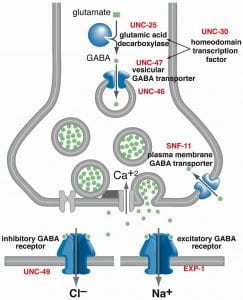 Researchers at UCLA demonstrated that the common over-the-counter dietary supplement gamma-Aminobutyric acid (also known as GABA) may aid in inhibiting the development of insulin resistance and glucose tolerance, two conditions that are known to be precursors to the development of both Type 2 diabetes and metabolic syndrome.
Researchers at UCLA demonstrated that the common over-the-counter dietary supplement gamma-Aminobutyric acid (also known as GABA) may aid in inhibiting the development of insulin resistance and glucose tolerance, two conditions that are known to be precursors to the development of both Type 2 diabetes and metabolic syndrome.
In the preclinical study, researchers gave GABA to mice that were obese, had developed insulin resistance, and were in the early stages of Type 2 diabetes. GABA is a naturally-produced compound similar to amino acids that plays an important role in inhibitory processes in the central nervous system of all mammals. When the researchers gave GABA to the mice, they found that the compound worked to suppress the inflammatory immune responses that are associated with the development of Type 2 diabetes.
According to the investigation’s authors, GABA aided in preventing progression of Type 2 diabetes; in addition, it improved insulin sensitivity and glucose tolerance in the mice, even after they had already developed Type 2 diabetes. They also identified regulatory immune cells that play a role in GABA’s inhibition of inflammation.
The research team commented that future studies on the effects of GABA on conditions associated with Type 2 diabetes could provide new medications based on the compound that treat metabolic syndrome and Type 2 diabetes related to obesity.
GABA has become popular in recent years as a dietary supplement promising everything from weight loss to muscle gain to reduced anxiety and depression to better sleep. Since GABA is an inhibitor, it is frequently promoted as a compound that stops excessive brain activity, allowing the individual to relax and eliminate anxiety. “It’s the brakes of your brain. It stops activity,” says Karl Doghramji, M.D., director of the Sleep Disorders Center at Thomas Jefferson University Hospital in Philadelphia.
It is thought that GABA reduces the effects of glutamate, a neurochemical that increases agitation and excitement. By taking GABA, individuals may be able to silence their overactive thoughts and, for example, get a better night’s sleep. Deficiencies in GABA levels are thought to cause a lack of “delta” sleep — the “deep” stage of sleep that begins about 45 minutes after one falls asleep. Lacking this type of sleep could be damaging to an individual’s mental health, according to Dr. Doghramji; those suffering with depression, anxiety, and other disorders often don’t get enough delta sleep.
Research shows that long-term deficiencies in delta sleep can cause more serious problems. One in three people who suffer with recurrent insomnia has some kind of psychiatric disorder, while 25% of those individuals also have anxiety problems.
However, there isn’t sufficient evidence yet to determine whether GABA supplements have an effect on improving sleep patterns and moods. “We just don’t have any data on them. We do not know how much GABA is really in the supplement or the product’s purity. There are no studies backing up the claims made by the supplement manufacturers.”
According to the New York University Langone Medical Center, there is no evidence that GABA supplements are effective in reducing symptoms from anxiety “presumably because the substance itself cannot pass the blood-brain barrier and enter the central nervous system.” Because they do not actually affect brain chemistry, GABA supplements are most likely ineffective in treating mood disorders, though they may still have some utility in treating hypertension.